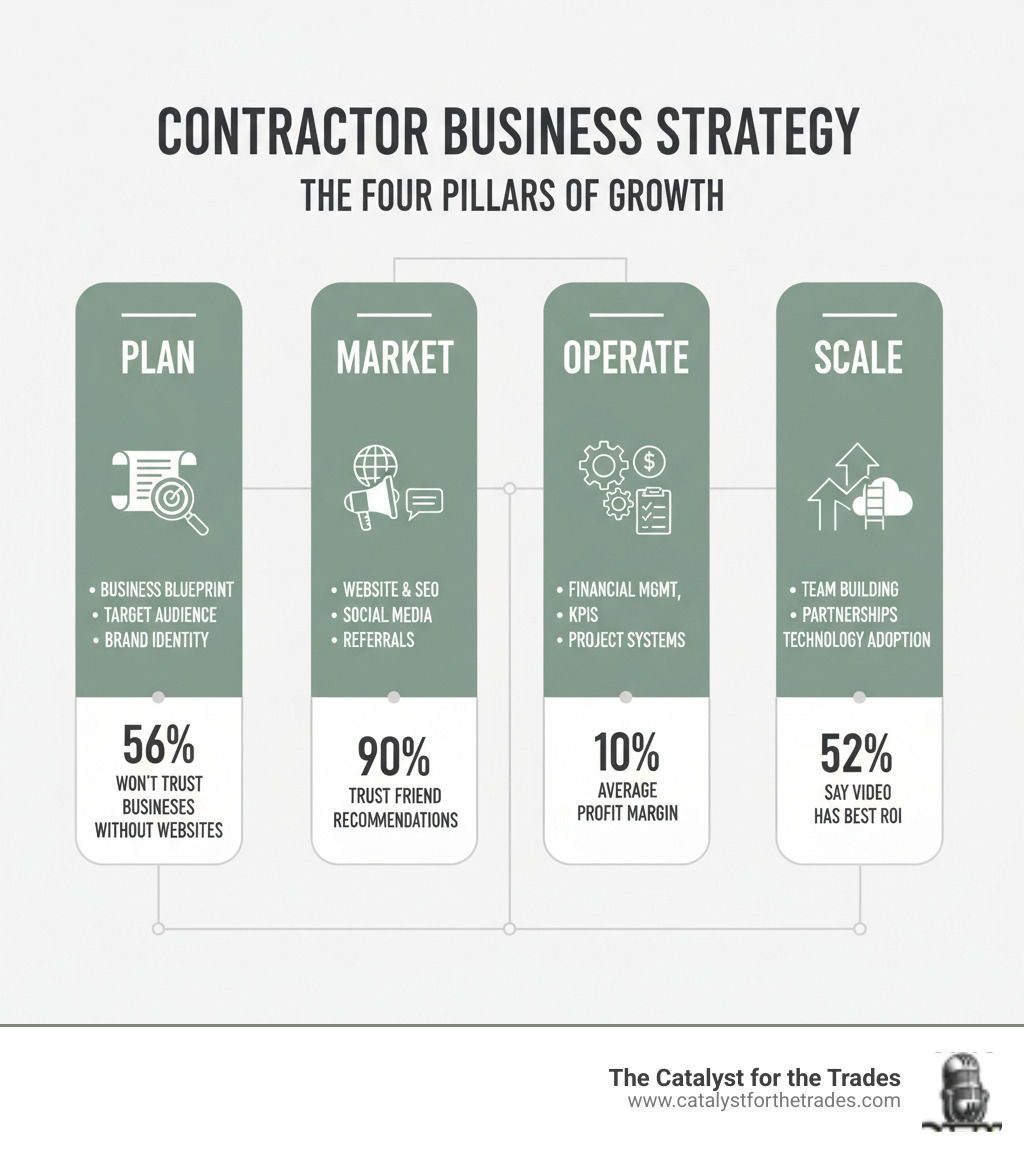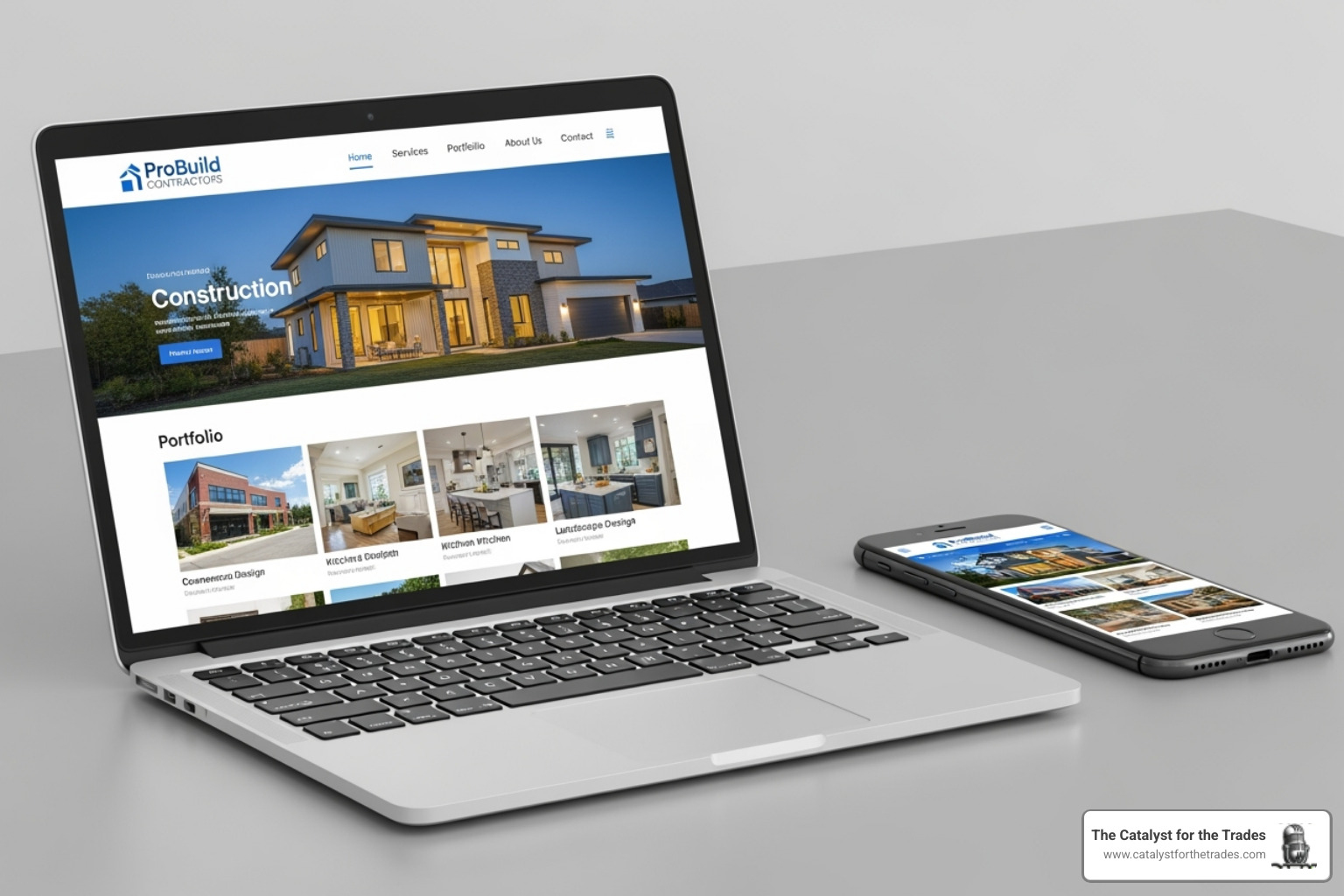Discover business acumen: core components, traits of leaders, development steps & metrics to boost decision-making and scale success.

Scaling New Heights: Strategic Planning for Home Service Contractors
From Doer to Director: Why Every Contractor Needs a Strategic Plan
Contractor business strategy is the roadmap that transforms a skilled tradesperson into a thriving business owner by defining your vision, target market, operational systems, and growth plan. Most contractors enter the industry because they're great at their craft—whether it's plumbing, electrical work, or remodeling. But technical skill alone doesn't guarantee a successful business. You're juggling job sites, managing crews, and chasing payments, leaving little time to think strategically about your company's future.
Core Elements of a Contractor Business Strategy:
- Business Planning - Define your vision, target market, and financial goals
- Marketing Systems - Build a digital presence and generate consistent leads
- Operational Excellence - Create repeatable processes and manage cash flow
- Strategic Growth - Scale your team, track KPIs, and plan for the future
The truth is, most contracting businesses operate without a formal strategic plan. This reactive approach means you're constantly solving daily crises instead of building a sustainable company. A solid contractor business strategy helps you build systems for predictable growth, creating a business that can thrive even when you're not on every job site.
Ready to build a business that scales? Learn how The Catalyst for the Trades helps contractors grow.

Contractor business strategy terms made easy:
Laying the Foundation: Your Business Blueprint
Think about your best construction project. You started with a clear blueprint, not just a hammer. Building a successful contracting business requires the same approach, and this foundational stage of your contractor business strategy is all about creating that blueprint. Skipping this step is common, so getting it right puts you miles ahead of the competition.

Crafting Your Contractor Business Plan
A business plan isn't just a document for a bank; it's your roadmap for growth. It forces you to solve problems on paper before they become expensive mistakes and keeps your team aligned. A functional plan includes:
- Executive Summary: A one-page overview of your business. Write it last, but put it first.
- Company Overview: Your purpose, values, company structure, and what makes you unique.
- Market Analysis: A deep dive into your ideal customers and competitors.
- Operations Plan: The nuts and bolts of service delivery, including staffing and equipment.
- Marketing Plan: A strategy for how customers will find you.
- Financial Plan: Your projected revenue, expenses, and startup costs. The average profit margin for contractors is around 10%, and understanding your numbers is key to beating that average.
Your business plan should be a living document, revisited quarterly to track progress and adjust as needed.
Defining Your Brand and Vision
Why should someone hire you? If your only answer is "we do good work," you need a stronger brand. Your contractor business strategy must make you memorable.
Start by defining your target audience. Don't target "everyone." Focus on your ideal customer, whether they're young families needing kitchen remodels or businesses needing commercial builds. This leads to niche specialization, allowing you to become the go-to expert for something specific, like sustainable building or historic renovations.
Your unique value proposition (UVP) is what makes you different. Do you guarantee completion dates or offer unprecedented price transparency? Make it clear and simple. This all comes together in your company vision—a clear picture of where you're going and why it matters. As we explore in the future of leadership: how to build a team that drives growth, a shared vision is what transforms a group of individuals into a high-performing team.
Legal and Licensing Essentials
This is the least exciting but most critical part of your contractor business strategy. Getting it wrong can destroy everything you've built.
- Business Registration & Licensing: Ensure your business is officially registered and that you hold all required state, county, and city licenses for your trade.
- Permits: Understand and pull all necessary building permits for your projects. Skipping this step is a gamble that's never worth taking.
- Insurance: This is non-negotiable. You'll need general liability, professional liability, and workers' compensation insurance at a minimum. Many contractors also insure their tools and equipment.
- Legal & Financial: Understand small business taxes, contract law, and employment regulations. A good accountant is an essential partner. For practical tax strategies, check out how to keep more of what you earn: year-end tax tips that actually work.
A solid legal foundation protects your business and allows you to scale with confidence.
The Growth Engine: Marketing and Sales Strategies
With a solid foundation, it's time to fire up the growth engine of your contractor business strategy: marketing and sales. This is how you attract clients and secure the projects that fuel your growth. The most effective approach blends modern digital tactics with proven traditional methods.

Building Your Digital Footprint
Your digital presence is your first impression. A staggering 56% of people stated they won't trust a business without a website. Your website is your 24/7 salesperson and digital storefront. A great contractor website must have:
- Clear contact information
- An impressive portfolio of high-quality project photos
- Client testimonials and reviews
- Detailed service descriptions
- Mobile responsiveness (looks great on any device)
While digital channels like your website, SEO, and social media offer the highest ROI, traditional methods like direct mail and networking events can still be effective for reaching specific local audiences. The key is to know where your ideal clients are and meet them there.
A Winning Digital Contractor Business Strategy
A website is just the start. An effective contractor business strategy uses digital tools to drive traffic and convert leads.
- Local SEO for contractors is critical. You need to appear at the top of Google when homeowners search for "plumber near me" or "kitchen remodeler in [your city]."
- Your Google Business Profile is often the first thing a potential client sees. Optimize it with accurate info, professional photos, and a steady stream of positive customer reviews.
- Content and video marketing establish you as an expert. Blog posts that answer common questions and videos that showcase your work build trust and engagement. In fact, 52% of marketing professionals name video as the content type with the best ROI. For more on this, explore AI Search Visibility.
Leveraging Social Media and Paid Ads
Social media is a powerful tool for authentic engagement. Platforms like Facebook, Instagram, and YouTube are perfect for contractors, allowing you to share visual content like before-and-after photos and project walk-throughs. Nextdoor is also invaluable, acting as a digital word-of-mouth platform where neighbors recommend local businesses. You can sign up for a Nextdoor Business Page for free to build your local reputation.
Paid advertising on Google and social media allows you to target specific demographics and locations, generating high-quality leads quickly.
Powering Word-of-Mouth and Referrals
Word-of-mouth remains a cornerstone of any contractor business strategy. A recent HubSpot study found that 90% of people believe brand recommendations from friends.
Systematically encourage referrals by asking satisfied clients to spread the word. Make it easy for them to leave online reviews on Google and other platforms. Collect detailed testimonials, including photos or videos, to use as powerful social proof on your website. As we emphasize in stop chasing new leads, start closing the ones you already have, nurturing existing relationships is often more profitable than constantly chasing new prospects.
Building a Resilient Contractor Business Strategy
With a solid foundation and a strong growth engine, your contractor business strategy must now focus on building resilience. This means creating robust operational and financial systems that allow you to scale predictably and withstand market shifts. Resilience is what ensures your business thrives consistently, not just for one good month.

Financial Management and Budgeting for Growth
Effective financial management is the backbone of a resilient contractor business strategy. Without it, even the busiest contractors can fail.
Managing cash flow is critical in construction, where you often pay for materials and labor long before receiving final payment. Implement project-centric cash flow forecasting to identify potential shortfalls before they become crises. A detailed budget should cover all fixed and variable costs, as well as investments in marketing and growth.
The average profit margin for contractors is around 10%, but smart pricing strategies and cost controls can increase this. Truly understand all your costs—including overhead, insurance, and the value of your expertise—to price your work profitably. For more insights, explore financial management contractors.
Measuring Success: KPIs for Your Contractor Business Strategy
How do you know if your contractor business strategy is working? By tracking Key Performance Indicators (KPIs). These metrics provide a real-time dashboard of your company's health. Essential KPIs for contractors include:
- Lead Conversion Rate: The percentage of leads that become customers.
- Customer Acquisition Cost (CAC): How much you spend to gain a new customer.
- Project Profit Margin: The profitability of individual jobs.
- Customer Satisfaction Score (CSAT): A measure of client happiness.
- Revenue Growth & Employee Retention: Key indicators of overall business health.
Regularly benchmarking these KPIs against industry standards helps you spot areas for improvement. Modern tools like AI Business Intelligence can revolutionize how you track and interpret this data.
Scaling Your Team and Operations
Growth isn't just about getting more jobs; it's about building the capacity to handle them without burnout. This means investing in your people and processes.
- Hiring and Retaining Talent: In a competitive labor market, attract and keep top talent with competitive pay, a positive work environment, and clear opportunities for growth.
- Investing in Training: Ongoing training boosts morale, improves safety, and increases productivity. It's an investment that pays for itself.
- Outsourcing Non-Core Tasks: Free up your time by outsourcing tasks like accounting or digital marketing to specialists. Focus on your core strengths.
- Building Strategic Partnerships: Form alliances with real estate agents, designers, and reliable subcontractors. The right partnerships, like choosing right vendors, can accelerate your growth trajectory.
Frequently Asked Questions about Contractor Business Strategy
How do I differentiate my contracting business from competitors?
Standing out in a crowded market requires a deliberate contractor business strategy. You can set yourself apart by:
- Focusing on a specific niche, such as sustainable building or smart home installations, to become a go-to expert.
- Delivering exceptional customer service. Clear communication, punctuality, and respect for a client's home create a lasting impression.
- Building a strong brand reputation through consistent quality and transparent business practices.
- Showcasing high-quality work through a professional portfolio with stunning photos and videos.
Innovation also plays a crucial role. As we've seen in how to use innovation to stand out in the home services industry, embracing new technologies can transform how clients perceive your business.
What is the most important part of a contractor's marketing strategy?
The most crucial element is a professional, mobile-friendly website. It acts as your digital storefront and provides instant credibility, as over half of consumers won't trust a business without one. This website should be the central hub for all your marketing. The next critical piece is local SEO, which ensures local homeowners find your website when they search for the services you offer.
How can I grow my business without getting overwhelmed?
Strategic growth is about building systems, not just working harder.
- Systemize your operations by documenting your processes, from bidding to project completion.
- Outsource tasks that aren't your core strength, like bookkeeping or digital marketing, to free up your time.
- Leverage technology to automate repetitive processes like appointment scheduling and lead follow-up.
As we explore in how systems create freedom: Mike Abramowitz's blueprint for trades success, robust systems are the key to scaling your business and your life simultaneously.
Conclusion: Build Your Business to Last
We've covered the essential elements of a winning contractor business strategy, from your foundational blueprint to the systems that create resilience. Strategy isn't a one-time document; it's a living process of planning, executing, and adapting. The contractors who thrive are those who accept technology, implement smart systems, and commit to continuous learning.
At The Catalyst for the Trades, we're passionate about empowering contractors with these strategies. The principles of solid planning, strategic marketing, and operational excellence are the pillars that will support your growth for years to come.
You don't have to figure this out alone. We're here to help you build a business that lasts—one that gives you freedom, not stress.
Ready to take the next step? Explore more business growth strategies on our blog and find how we can help you build the future you've been working toward.

Discover how leading home‑service companies are leveraging AI, subscription models, and digital‑first strategies.
Learn why private equity, automation, and customer‑centric tech are reshaping the trades.
Episodes you may like


Lead your crew to victory! Master essential contractor leadership strategies for project success, safety, and team empowerment.

Harness real-time data with cortex pulse analytics. Get AI-driven insights, detect issues instantly, and make smarter business decisions.
.png)


